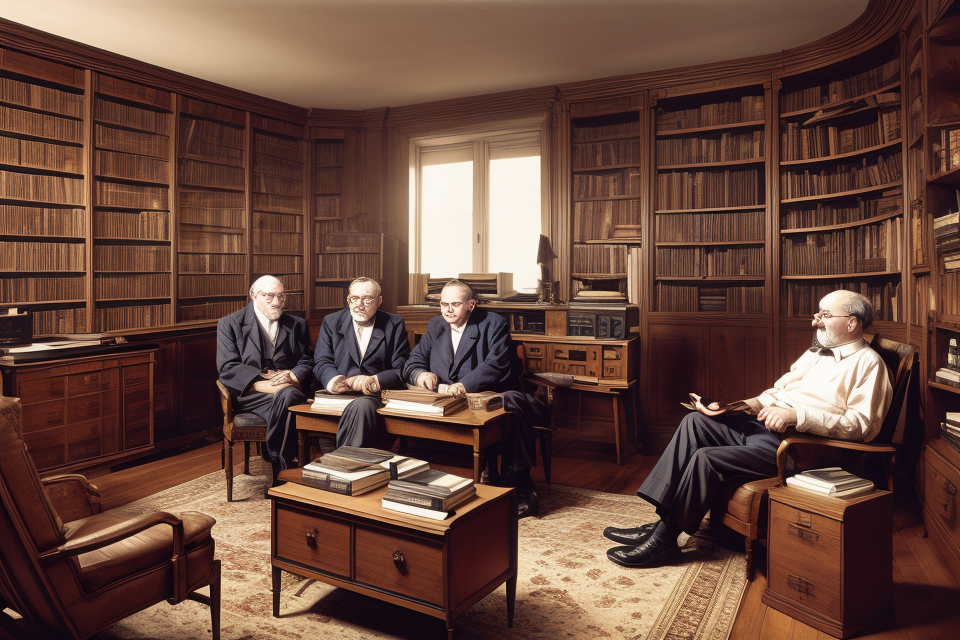Artificial Intelligence (AI) has come a long way since its inception in the 1950s. Today, it’s an integral part of our daily lives, from virtual assistants like Siri and Alexa to self-driving cars. But who was the pioneer behind this revolutionary technology? The answer is not straightforward, as there were several researchers who made significant contributions to the development of AI. In this article, we will explore the contributions of some of the earliest pioneers in AI and try to uncover who could be considered the “father of AI.” Join us as we delve into the fascinating world of AI and its creators.
The “Father of AI” is a title that has been given to several individuals who made significant contributions to the field of artificial intelligence (AI) in its early stages. One of the most prominent candidates for this title is John McCarthy, who coined the term “artificial intelligence” in 1955 and was a pioneer in the development of AI research. McCarthy’s work focused on the creation of intelligent agents that could learn and adapt to their environment, and he was one of the first researchers to explore the potential of AI for solving real-world problems. Other notable figures who have been referred to as the “Father of AI” include Marvin Minsky, who co-founded the MIT Artificial Intelligence Laboratory, and Alan Turing, who made significant contributions to the development of computer science and cryptography. Ultimately, the title of “Father of AI” is a testament to the significant contributions made by many individuals to the field of artificial intelligence over the years.
The Beginnings of Artificial Intelligence
The Birth of the Idea
The birth of the idea of artificial intelligence can be traced back to the early 20th century when a group of scientists and mathematicians began exploring the possibility of creating machines that could think and learn like humans. The concept of AI was initially developed in the field of cybernetics, which aimed to create machines that could control and communicate with other machines.
One of the earliest researchers in the field of AI was Alan Turing, a British mathematician and computer scientist who is best known for his work on code-breaking during World War II. Turing proposed the idea of a “universal machine” that could perform any calculation or task, and his work laid the foundation for the development of modern computers.
Another key figure in the early history of AI was John McCarthy, an American computer scientist who coined the term “artificial intelligence” in 1955. McCarthy believed that machines could be programmed to mimic human intelligence and developed the first AI programming language, Lisp.
Marvin Minsky and Seymour Papert were also important figures in the early development of AI. Minsky, a mathematician and computer scientist, is known for his work on neural networks and the development of the first AI robot, the Tic-Tac-Toe playing machine. Papert, a computer scientist and mathematician, is known for his work on artificial intelligence and education, and he developed the first AI tutoring system.
These early researchers and their work laid the foundation for the development of modern AI, and their contributions continue to shape the field today.
The Turing Test
The Turing Test is a measure of a machine’s ability to exhibit intelligent behavior equivalent to, or indistinguishable from, that of a human. It is a test of a machine’s ability to imitate human-like conversation and decision-making processes. The test was proposed by Alan Turing, a mathematician and computer scientist who made significant contributions to the field of artificial intelligence.
Turing’s contributions to AI were significant as he laid the foundation for the development of intelligent machines. He proposed the idea of the Turing Test as a way to determine whether a machine could exhibit intelligent behavior. Turing believed that if a human evaluator could not tell the difference between a machine’s responses and those of a human, then the machine could be considered intelligent.
The Turing Test has been a subject of much debate in the field of AI. Critics argue that passing the test does not necessarily mean that a machine is truly intelligent, as it only measures the machine’s ability to mimic human-like behavior. Proponents of the test argue that it is a useful tool for evaluating a machine’s ability to exhibit intelligent behavior.
In summary, the Turing Test is a measure of a machine’s ability to exhibit intelligent behavior, proposed by Alan Turing, and remains a subject of much debate in the field of AI.
Early AI Systems
The development of the first AI systems can be traced back to the 1950s when computer science was still in its infancy. These early AI systems were designed to simulate human intelligence and perform tasks that were previously thought to be the exclusive domain of humans.
The Logical Computers
The first generation of AI systems was built on the concept of “logical computers.” These computers were designed to perform calculations based on a set of rules or algorithms. The development of these logical computers was made possible by the invention of the first electronic computer, the ENIAC, in 1945.
The Dartmouth Conference
In 1956, a group of scientists and researchers gathered at Dartmouth College to discuss the possibility of creating machines that could simulate human intelligence. This meeting, known as the Dartmouth Conference, is considered to be the birthplace of artificial intelligence.
The First AI Systems
The first AI systems were designed to perform simple tasks such as playing games, solving mathematical problems, and recognizing patterns. One of the earliest AI systems was the “Turing Test,” which was developed by Alan Turing in 1950. The Turing Test was designed to determine whether a machine could exhibit intelligent behavior that was indistinguishable from that of a human.
Another early AI system was the “General Problem Solver,” which was developed by John McCarthy in 1959. This system was designed to solve problems by searching through a set of rules and algorithms to find a solution.
The Limits of Early AI Systems
Despite their impressive capabilities, the early AI systems had significant limitations. One of the biggest challenges was the lack of data available to train the machines. Without sufficient data, the machines were unable to learn and adapt to new situations.
Another challenge was the lack of computing power. The early computers were slow and limited in their processing capabilities, which made it difficult to create more complex AI systems.
Despite these challenges, the early pioneers of AI paved the way for the development of modern AI systems. Their work laid the foundation for the next generation of AI researchers and helped to establish AI as a legitimate field of study.
The Contenders for the Title of “Father of AI”
John McCarthy
John McCarthy: A Pioneer in AI Research
John McCarthy was a prominent computer scientist and one of the early pioneers in the field of artificial intelligence (AI). He was born in 1927 and earned his Bachelor’s degree in Electrical Engineering from the Massachusetts Institute of Technology (MIT) in 1948. He went on to receive his Ph.D. in Mathematics from Princeton University in 1951.
His Work on AI and its Significance
McCarthy’s work on AI began in the 1950s, and he was one of the first researchers to propose the idea of a “machine that could think for itself.” He is widely regarded as one of the founders of the field of AI, and his contributions to the development of the field are significant.
McCarthy was a strong advocate for the development of intelligent machines, and he believed that AI could be achieved through the creation of machines that could reason, learn, and solve problems on their own. He was also one of the first researchers to propose the idea of a “knowledge representation,” which is a fundamental concept in AI.
The Lisp Programming Language and its Impact on AI
One of McCarthy’s most significant contributions to the field of AI was the development of the Lisp programming language. Lisp is a programming language that is particularly well-suited for AI research because it allows programmers to represent and manipulate data in a highly flexible and expressive way.
McCarthy’s work on Lisp was groundbreaking, and the language quickly became the language of choice for many AI researchers. The language’s flexibility and expressiveness made it particularly well-suited for AI research, and it was used to develop many of the early AI systems, including the famous Dartmouth AI system, which was developed by McCarthy and his colleagues in the early 1960s.
Overall, John McCarthy’s contributions to the field of AI were significant, and his work on the Lisp programming language was particularly influential. He was a pioneer in the field of AI, and his ideas and contributions continue to influence the development of AI today.
Marvin Minsky
Marvin Minsky was a prominent figure in the field of artificial intelligence, who made significant contributions to the development of AI. He was the co-founder of the AI Lab at MIT, which was one of the first research centers dedicated to the study of artificial intelligence.
Minsky’s contributions to AI began in the early 1950s, when he worked alongside John McCarthy at the Massachusetts Institute of Technology. Together, they developed the first AI system, which was capable of playing checkers. This system was the first of its kind and marked a significant milestone in the history of artificial intelligence.
Minsky’s work at the AI Lab at MIT focused on the development of intelligent machines that could mimic human thought and behavior. He believed that machines could be programmed to learn and reason, and he developed a number of theories and algorithms that were used to develop intelligent systems.
One of Minsky’s most significant contributions to the field of AI was his work on the concept of symbolic manipulation. He developed a theory of how machines could be programmed to manipulate symbols, which he believed could be used to simulate human thought processes. This theory formed the basis of many of the early AI systems that were developed in the 1950s and 1960s.
Minsky also made significant contributions to the field of robotics, and he developed a number of robots that were capable of performing complex tasks. His work on robotics helped to pave the way for the development of modern robotics, and his ideas continue to influence the field today.
Overall, Marvin Minsky was a pioneer in the field of artificial intelligence, and his contributions to the development of AI have had a lasting impact on the field. His work on symbolic manipulation and robotics helped to lay the foundation for many of the advances that have been made in AI in recent years.
Norbert Wiener
The Mathematician Who Coined the Term “Cybernetics”
Norbert Wiener, an American mathematician, is considered one of the founding figures in the field of cybernetics. He coined the term “cybernetics” in 1948, drawing inspiration from the Greek word “kybernetes,” meaning “steersman” or “pilot.” This term referred to the study of systems that could be controlled and steered, whether they were mechanical or biological.
His Work on AI and Its Influence on Early Researchers
Wiener’s work on cybernetics significantly influenced the development of artificial intelligence (AI). In his book “Cybernetics: Or Control and Communication in the Animal and the Machine” (1948), he discussed the concept of “feedback,” which is a crucial aspect of AI. Feedback loops enable machines to learn from their experiences and adjust their behavior accordingly. Wiener’s work laid the groundwork for early AI researchers to explore the potential of creating intelligent machines that could learn and adapt like humans.
Additionally, Wiener’s work on AI focused on creating machines that could think and reason like humans. He proposed that AI systems should be designed to process information using the same principles as human cognition. Wiener’s ideas on cognitive processing influenced the development of the “Gordon and Marr” models of AI, which proposed different approaches to AI based on symbolic manipulation and parallel processing.
In conclusion, Norbert Wiener’s work on cybernetics and AI laid the foundation for early researchers in the field. His contributions, particularly in the areas of feedback loops and cognitive processing, helped shape the development of intelligent machines. As a result, Wiener is often considered one of the leading contenders for the title of “Father of AI.”
Alan Turing
Alan Turing was a British mathematician, computer scientist, and cryptanalyst who is widely regarded as one of the most influential figures in the development of artificial intelligence (AI). Turing’s work on AI and the Turing Test, in particular, has been instrumental in shaping the field of AI as we know it today.
- The mathematician who cracked the Enigma code
During World War II, Turing worked at Bletchley Park, where he played a key role in cracking the Enigma code, a feat that helped the Allies win the war. This achievement not only showcased Turing’s exceptional mathematical skills but also demonstrated his ability to think creatively and solve complex problems.
- His work on AI and the Turing Test
Turing’s most significant contribution to the field of AI was his development of the Turing Test, a thought experiment that proposed a way to determine whether a machine could exhibit intelligent behavior that was indistinguishable from that of a human. In his 1950 paper “Computing Machinery and Intelligence,” Turing argued that if a human evaluator could not tell the difference between a machine’s responses and those of a human, then the machine could be considered intelligent.
The Turing Test has since become a benchmark for evaluating the success of AI systems and has inspired decades of research in the field. Turing’s work on AI also laid the groundwork for the development of other important concepts in AI, such as the concept of a “universal Turing machine,” which is a theoretical machine that can simulate the behavior of any other machine.
Overall, Turing’s contributions to the field of AI have been enormous, and his work continues to inspire and influence researchers and developers working in the field today.
Other Contenders
There are several other contenders for the title of “Father of AI” besides Alan Turing and John McCarthy. Two notable figures who have been recognized for their significant contributions to the field of artificial intelligence are Herbert Simon and John Horton Conway.
Herbert Simon
Herbert Simon was an American social scientist and professor of psychology at Carnegie Mellon University. He was one of the pioneers of artificial intelligence and is known for his work on cognitive modeling and problem-solving. Simon developed the concept of “bounded rationality,” which emphasizes the limitations of human decision-making processes. He also introduced the idea of “satisficing” – a combination of the words “satisfy” and “suffice” – to describe the behavior of individuals who are willing to accept an imperfect solution rather than seeking the optimal one.
Simon’s contributions to AI include the development of the “Logical Calculus of Ideas” – a theoretical model of reasoning that he created in collaboration with Allen Newell. This model, also known as the “General Problem Solver,” was the first AI system to demonstrate that problem-solving could be modeled as a series of steps. Simon and Newell’s work laid the foundation for the development of rule-based expert systems, which were widely used in the 1980s.
John Horton Conway
John Horton Conway is a British mathematician and academic who has made significant contributions to various fields, including AI, computer science, and game theory. Conway is best known for his work on cellular automata, which are mathematical models that simulate the behavior of simple systems. He is also known for his contributions to the development of the Game of Life, a mathematical model that simulates the evolution of simple organisms.
Conway’s work in AI includes the development of the “Knowledge Compilation Principles,” which provide a framework for converting a knowledge-based system into an efficient and practical implementation. These principles are still widely used in AI today and have been instrumental in the development of rule-based expert systems and knowledge representation systems.
In conclusion, while Alan Turing and John McCarthy are widely recognized as the pioneers of AI, Herbert Simon and John Horton Conway have also made significant contributions to the field. Their work has helped shape the development of AI and has had a lasting impact on the field.
The AI Community’s View on the “Father of AI”
Opinions and Debates
Different Opinions on Who Should be Credited as the Father of AI
- The AI community has diverse opinions on who should be considered the father of AI.
- Some believe that the honor should go to Alan Turing, the mathematician who proposed the Turing Test as a measure of a machine’s ability to exhibit intelligent behavior.
- Others argue that the title should be given to John McCarthy, who coined the term “artificial intelligence” in 1955 and made significant contributions to the field.
- Some members of the AI community suggest that the title should be shared among multiple individuals, such as Marvin Minsky, Norbert Wiener, and Herbert Simon, who all made important contributions to the early development of AI.
Ongoing Debates and Discussions in the AI Community
- The debate over who should be considered the father of AI continues to be a topic of discussion in the AI community.
- Many argue that the focus should be on the contributions of multiple individuals rather than just one person.
- Others believe that the title should be given to the individual who made the most significant contribution to the field, regardless of whether it was a single person or a group of individuals.
- The debate is a reflection of the complexity and diversity of the field of AI, as well as the many different perspectives and approaches to the study of intelligence in machines.
The Importance of Recognizing Contributions
- Acknowledging the pioneers of AI:
- Recognizing the individuals who laid the foundation for the field of AI
- Understanding the historical context and the challenges faced by these pioneers
- Honoring their legacy and the impact of their work on the development of AI today
- The significance of acknowledging the pioneers of AI:
- Establishing a historical perspective on the evolution of AI
- Highlighting the importance of collaboration and interdisciplinary research in the field of AI
- Inspiring future generations of AI researchers and practitioners
- The impact of their work on the development of AI today:
- The pioneers of AI have made significant contributions to the field that continue to influence the development of AI today
- Their work has shaped the current landscape of AI research and development
- Their legacy continues to inspire and guide the future of AI research and development.
FAQs
1. Who is considered the father of artificial intelligence?
Answer:
The person who is widely considered to be the father of artificial intelligence is John McCarthy. He coined the term “artificial intelligence” in 1955 and was one of the pioneers in the field of AI research. McCarthy’s work laid the foundation for many of the advancements in AI that we see today. He developed the first AI programming language, Lisp, and made significant contributions to the development of the AI field.
2. What were some of John McCarthy’s major contributions to artificial intelligence?
John McCarthy made many significant contributions to the field of artificial intelligence. One of his most important contributions was the development of the first AI programming language, Lisp. He also made significant contributions to the field of machine learning, including the development of the first AI algorithms for pattern recognition and problem-solving. Additionally, McCarthy was one of the pioneers in the field of robotics, and his work laid the foundation for many of the advancements in robotics that we see today.
3. How did John McCarthy’s work impact the development of artificial intelligence?
John McCarthy’s work had a significant impact on the development of artificial intelligence. His contributions to the field of AI programming languages, such as Lisp, made it easier for researchers to develop and test AI algorithms. Additionally, his work in machine learning and robotics laid the foundation for many of the advancements in these fields that we see today. McCarthy’s work helped to establish AI as a legitimate field of study, and his influence can be seen in the work of many modern AI researchers.
4. Were there any other notable figures in the early development of artificial intelligence?
Yes, there were many other notable figures in the early development of artificial intelligence. Some of the other pioneers in the field include Marvin Minsky, who co-founded the AI laboratory at MIT, and Norbert Wiener, who made significant contributions to the field of cybernetics. Additionally, Alan Turing, who is known for his work on computers and cryptography, made important contributions to the development of AI through his work on machine learning and neural networks. These individuals, along with John McCarthy, helped to lay the foundation for the field of artificial intelligence as we know it today.



